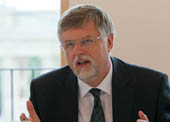No Russian proposed document was discussed in Geneva
By Ana Robakidze
Monday, October 13


“Given the high level of public interest in the issues on the agenda of the International Geneva Discussions, the Press and Information Department of the Georgian MFA wishes to make an explanation regarding the statement of the Russian Foreign Ministry, according to which the participants of the 29th round allegedly discussed a draft of the joint statement presented by Russia regarding the non-use of force and security guarantees. We wish to emphasize that the participants of the Geneva talks have not discussed any such document initiated by Russia, to which attests a communique issued by the co-chairs of the International Geneva Discussions,” the MFA statement reads.
According to the communique issued by the co-chairs in Working Group I, the participants began their discussion with a review of the security situation on the ground and exchanged views on the non-use of force, international security arrangements, as well as best practices and cooperation. They have agreed to continue working on a draft joint statement by participants on the non-use of force at the next Geneva round.
The Georgian side is still satisfied with the talks, according to First Deputy Foreign Minister of Georgia, David Zalkaliani, who leads the country’s delegation at the Geneva talks. Most importantly, the Georgian side managed to succeed and stop all the discussions on changing the format of these talks.
According to the Georgian side, the Russian delegation tried to bring up the issue of NATO-Georgian cooperation. Head of the Delegation, Russian Deputy-Foreign Minister Gregori Karasin tried to discuss the future of NATO infrastructure in Georgia, which Russia believes could be a threat to stability in the Caucasus region.
Zalkaliani reminded the Russian side about the frozen conflicts that continue to be an actual threat to stability in the region and refused to discuss NATO-Georgian relations further, as the topic was not supported by the format of the talks.
According to Ambassador Herbert Salber, EU Special Representative for the South Caucasus and the Crisis in Georgia, the talks took place in a constructive and positive atmosphere. He emphasized that all participants had reconfirmed their commitment to the Geneva Discussions as an important platform to strengthen the security and stability on the ground and to address the humanitarian needs of the conflict-affected population.
Based on the format of the talks, the discussions took place in two working groups, focusing on the security situation in the Caucasus region and on humanitarian issues respectively. In Working Group I, the participants exchanged views on the non-use of force, and international security arrangements. Working Group II addressed issues including the freedom of movement, missing persons, cultural heritage, and access to water.
The next meeting in the Geneva format will be held on 9-10 December of 2014.
